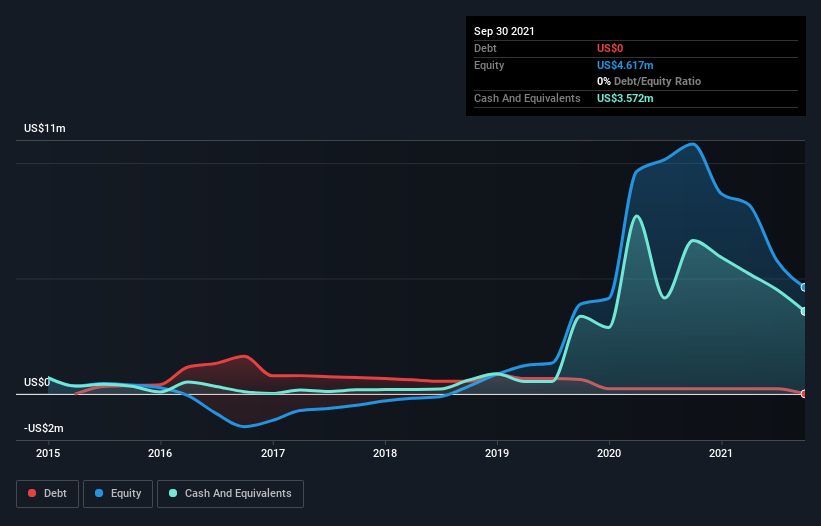Stock Analysis
- United States
- /
- Healthtech
- /
- NasdaqCM:MEDS
Here's Why We're Watching TRxADE HEALTH's (NASDAQ:MEDS) Cash Burn Situation

Even when a business is losing money, it's possible for shareholders to make money if they buy a good business at the right price. For example, biotech and mining exploration companies often lose money for years before finding success with a new treatment or mineral discovery. But while the successes are well known, investors should not ignore the very many unprofitable companies that simply burn through all their cash and collapse.
Given this risk, we thought we'd take a look at whether TRxADE HEALTH (NASDAQ:MEDS) shareholders should be worried about its cash burn. For the purposes of this article, cash burn is the annual rate at which an unprofitable company spends cash to fund its growth; its negative free cash flow. We'll start by comparing its cash burn with its cash reserves in order to calculate its cash runway.
View our latest analysis for TRxADE HEALTH
Does TRxADE HEALTH Have A Long Cash Runway?
A company's cash runway is the amount of time it would take to burn through its cash reserves at its current cash burn rate. As at September 2021, TRxADE HEALTH had cash of US$3.6m and no debt. Looking at the last year, the company burnt through US$2.9m. Therefore, from September 2021 it had roughly 15 months of cash runway. While that cash runway isn't too concerning, sensible holders would be peering into the distance, and considering what happens if the company runs out of cash. Depicted below, you can see how its cash holdings have changed over time.

How Well Is TRxADE HEALTH Growing?
TRxADE HEALTH actually ramped up its cash burn by a whopping 60% in the last year, which shows it is boosting investment in the business. As if that's not bad enough, the operating revenue also dropped by 44%, making us very wary indeed. Taken together, we think these growth metrics are a little worrying. While the past is always worth studying, it is the future that matters most of all. For that reason, it makes a lot of sense to take a look at our analyst forecasts for the company.
How Easily Can TRxADE HEALTH Raise Cash?
TRxADE HEALTH revenue is declining and its cash burn is increasing, so many may be considering its need to raise more cash in the future. Issuing new shares, or taking on debt, are the most common ways for a listed company to raise more money for its business. Many companies end up issuing new shares to fund future growth. By comparing a company's annual cash burn to its total market capitalisation, we can estimate roughly how many shares it would have to issue in order to run the company for another year (at the same burn rate).
Since it has a market capitalisation of US$29m, TRxADE HEALTH's US$2.9m in cash burn equates to about 9.9% of its market value. Given that is a rather small percentage, it would probably be really easy for the company to fund another year's growth by issuing some new shares to investors, or even by taking out a loan.
So, Should We Worry About TRxADE HEALTH's Cash Burn?
On this analysis of TRxADE HEALTH's cash burn, we think its cash burn relative to its market cap was reassuring, while its falling revenue has us a bit worried. We don't think its cash burn is particularly problematic, but after considering the range of factors in this article, we do think shareholders should be monitoring how it changes over time. Taking a deeper dive, we've spotted 3 warning signs for TRxADE HEALTH you should be aware of, and 1 of them is potentially serious.
Of course TRxADE HEALTH may not be the best stock to buy. So you may wish to see this free collection of companies boasting high return on equity, or this list of stocks that insiders are buying.
Valuation is complex, but we're helping make it simple.
Find out whether TRxADE HEALTH is potentially over or undervalued by checking out our comprehensive analysis, which includes fair value estimates, risks and warnings, dividends, insider transactions and financial health.
View the Free AnalysisThis article by Simply Wall St is general in nature. We provide commentary based on historical data and analyst forecasts only using an unbiased methodology and our articles are not intended to be financial advice. It does not constitute a recommendation to buy or sell any stock, and does not take account of your objectives, or your financial situation. We aim to bring you long-term focused analysis driven by fundamental data. Note that our analysis may not factor in the latest price-sensitive company announcements or qualitative material. Simply Wall St has no position in any stocks mentioned.
Have feedback on this article? Concerned about the content? Get in touch with us directly. Alternatively, email editorial-team (at) simplywallst.com.
About NasdaqCM:MEDS
TRxADE HEALTH
Operates as a health services information technology (IT) company in the United States.
Medium with adequate balance sheet.

